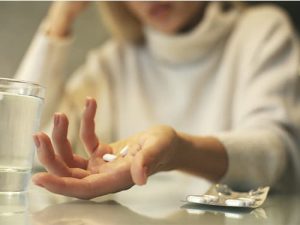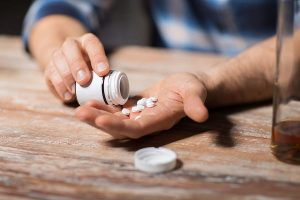Klonopin works by depressing the central nervous system since it falls under Benzodiazepine medications, which are typically prescribed to treat seizure disorders, panic attacks, and anxiety. This drug can be habit-forming when taken in unconventional ways than prescribed or for longer than intended. When someone stops taking Klonopin after using it for a long time, they can experience withdrawal, leading to intense cravings for the drug. These cravings can be psychological and physical.
Klonopin Cravings and Relapse
 Stressors and environmental triggers often cause psychological cravings for Klonopin since people usually take this medication to help with social anxiety. This is why social situations can prompt Klonopin cravings so the user can feel more comfortable.
Stressors and environmental triggers often cause psychological cravings for Klonopin since people usually take this medication to help with social anxiety. This is why social situations can prompt Klonopin cravings so the user can feel more comfortable.
Physical Klonopin cravings are primarily an issue during withdrawal and can reduce with time. These types of cravings can occur because the body and the brain have gotten used to the drug, and as they get back to normal functioning, the withdrawal symptoms and physical cravings start to subside.
People in Klonopin addiction treatment who are recovering should expect cravings and accept that they are part of the recovery process to achieve sobriety.
To help prevent Klonopin relapse and fight cravings, recovering users should know the typical indications of a possible relapse:
 Stopping recovery meetings: If you want to sustain lasting sobriety from Klonopin addiction, regularly attend support groups. Once you stop going to these recovery meetings, it significantly increases the chances of relapse.
Stopping recovery meetings: If you want to sustain lasting sobriety from Klonopin addiction, regularly attend support groups. Once you stop going to these recovery meetings, it significantly increases the chances of relapse.- Significant life events: Any negative or positive life events can set off a relapse. Such events could include the birth of a child, death of a loved one, breakups, starting a new job, losing a job, divorce, graduations, or weddings. When you are going through a significant life change, you need to look for support to help keep up your sobriety.
- Self-isolating: it is essential to keep an active social life for the recovery process to work to your advantage. Recovering users who start isolating themselves from friends and family typically increase their relapse risk.
- Reconnecting with old friends: It is typically unadvisable to associate with people who are still taking drugs regardless of how much you miss them. If you start to link up with drug-using friends, this could be a probable sign of relapse.
Managing cravings properly is essential for ongoing recovery and relapse prevention. Here are some of the methods to deal with Klonopin cravings to reduce the risk of relapse:
- Practicing proper sleep hygiene by keeping a routine schedule for sleep and waking times helps to reduce cravings.
- Relaxation methods such as meditation, guided imagery, and progressive muscle relaxation can help recovering Klonopin users deal with anxiety and stress and reduce cravings for the drug.
- Urge surfing, a mindfulness practice, involves sitting with closed eyes whenever the urge comes up and observing one’s sensations or thoughts while saying them aloud. Keep doing this until the craving passes.
- Mindfulness involves recognizing Klonopin cravings for what they are instead of avoiding them. The user ideally develops an awareness of their environment, feelings, or thoughts during cravings and waits for them to pass. Focus on the feelings and thoughts created by the cravings.
- Cognitive behavioral therapy techniques such as observing the consequences of drug use, coping skills, and self-identifying and observing triggers help manage cravings.
- Daily meditation for at least 10 to 15 minutes can enhance one’s mental health and help manage stress, reducing the chances of relapse.
- Healthy nutrition through a balanced diet is crucial for recovery after Klonopin addiction treatment. It reduces the severity of cravings and withdrawal symptoms, improves mental and physical health, and ultimately reduces the urge to use Klonopin.
- Exercise helps maintain overall health and releases endorphins which can minimize the risk of relapse. Aim for at least 30 minutes daily of moderate exercise.
- Hobbies keep you occupied and reduce your urge to use Klonopin. They can include sports, biking, hiking, playing instruments, painting, dancing, sewing, or cooking.
- Removing all drugs and addictive substances from the home can also reduce the temptation to use Klonopin.
Klonopin Relapse Prevention Strategies
- Getting a sponsor: This is a sober individual who has also recovered from Klonopin addiction whom you can contact if you feel at risk for relapse or are experiencing cravings.
- Establishing a sound support system: When you have a support system, this reduces the likelihood of relapse instead of when you are isolated. Develop these healthy relationships with sober people.
- Regular attendance of support groups: This ensures constant support during the recovery process while reminding you why you chose to stop using drugs and showing you how to handle triggers and cravings.
Aftercare Programs
 Ongoing aftercare programs after Klonopin addiction treatment are essential for sustaining one’s health and long-term sobriety. Aftercare recovery programs are typically done after one has finished a formal treatment program, including sober living residences, 12-step meetings, group therapy, and individual therapy. Relapse prevention and aftercare work the best together as these programs offer necessary support as long as needed.
Ongoing aftercare programs after Klonopin addiction treatment are essential for sustaining one’s health and long-term sobriety. Aftercare recovery programs are typically done after one has finished a formal treatment program, including sober living residences, 12-step meetings, group therapy, and individual therapy. Relapse prevention and aftercare work the best together as these programs offer necessary support as long as needed.
According to research, aftercare programs are crucial for lasting recovery success. People who have participated in the same have been shown to have more favorable outcomes than those who did not get aftercare services. Fortunately, technology has made it so you can get aftercare services through online forums and apps, which can be helpful instead of relying only on in-person treatment.
Depending on the individual’s circumstances, aftercare support can comprise the following:
- Family therapy
- Goal-setting
- Breathwork
- Meditation
- Cognitive-behavioral therapy
- Mindfulness-based practices
Studies have shown that mindfulness can connect people to their feelings and thoughts while helping to manage emotional and physical states that can cause relapse. This practice also shows individuals how to put less guilt and blame on themselves if they relapse, which can help prevent relapse in the future. Mindfulness approaches also show you how to identify triggers and early relapse warning signs. This, in turn, helps one establish healthier coping mechanisms for handling cravings and stressful situations.
The period after Klonopin addiction treatment is very sensitive for recovering users. Having a sound support system of loved ones and sober associates while upholding personal boundaries is crucial for preventing relapse.
